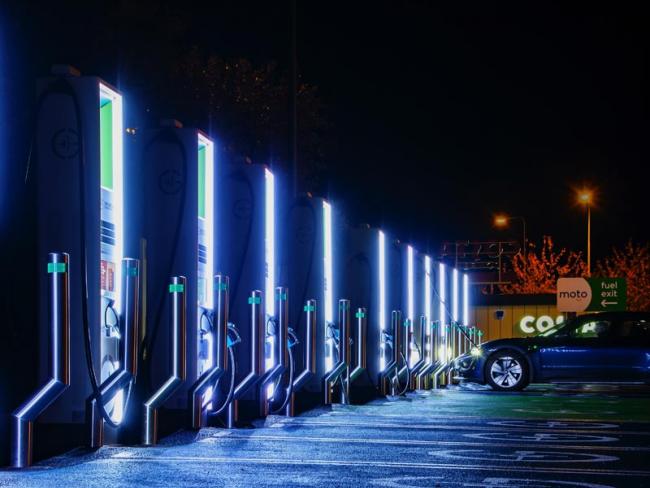
Unused EV charging places on a forecourt in Exeter. Photo Doodeez/shutterstock.com.
Looking for someone to explain precisely what’s wrong with the government’s net zero targets? A new book could help…
Not zero: how an irrational target will impoverish you, help China (and won’t even save the planet), by Ross Clark, paperback, 272 pages, ISBN 978-1800752443, Forum Press, 2024, £12.99. Kindle and eBook editions available.
This is a fascinating and well researched study of the prospects of implementing net zero policies, particularly as applied in Britain. Author Ross Clark scorns the government’s approach of just setting a date to phase out carbon emission and expecting the market to deliver all the solutions.
The government, the Labour opposition and the Green lobby hoped that last year’s auction for offshore wind power would show that wind power could compete with fossil fuels. But there were no bids because nobody could make a profit on the energy prices offered.
The auction fiasco should, in a sensible world, make the government, the opposition and the Greens realise that we have to license North Sea oil and gas drilling to keep the lights on. But there is no sign of any rethinking.
Sunak and Starmer alike still say they want a net zero carbon electricity system by 2030, and still oppose licences to drill for North Sea oil and gas. The Labour Party pledges to take fossil fuels out of all of our electricity supply by 2030.
So, net zero by 2030 or even 2050 is not going to happen. But the £3 trillion bill to supposedly get us there means denying us warm, comfortable homes, and denying us affordable travel by road and air.
Destruction
Net zero gives the government an incentive to destroy industry: the more industry it drives away from Britain, the lower our emissions, and the closer it gets to its net zero target. As Gary Smith, general secretary of the GMB union, recently said, “We’ve cut carbon emissions by decimating working-class communities.” Industry is not the problem: it is the solution, as Clark points out.
Our industries are at risk from current inefficient energy policies. For example, between 1997 and 2021 British steel production fell from 1.6 million tonnes to 710,000 tonnes. That’s largely because we paid £46.60 per megawatt hour for electricity while German steel producers paid just £25. We now import over 60 per cent of the steel we use, risking our steel security.
‘Closing steel plants would just send the emissions overseas…’
Clark notes that closing steel plants and importing steel would reduce to zero the contribution of steel to Britain’s carbon emissions. It would send these emissions overseas, most likely to China which in 2019 produced 56 per cent of the world’s steel. Other transitions are tricky too. On domestic heating, Clark comments that the government plans to switch millions of British homes from effective gas- and oil-fired boilers to electric heat pumps. They are much more expensive and costly to run but less effective.
Switching to heat pumps and to electric vehicles will cause a huge rise in demand for electricity. To reach net zero, all this extra electricity must come from renewable energy or other low carbon sources. That means many more wind turbines and extra energy storage, plus huge investment in the electricity grid. And how energy-efficient is it for a vehicle to carry a half-ton battery around?
Britain’s aviation industry is under threat too. The research body on resource efficiency UK Fires stated in a 2019 report that “there are no options for zero-emissions flight in the time available for action, so the industry faces a rapid contraction.”
The government’s Green allies openly call for “degrowth” – that is, a permanent slump. Scientifically dubious claims and hyperbole abound, such as “Our world is on fire.” But satellite data collected by the NASA Earth Observatory shows that since 2003 the global area being burned annually by wildfires has fallen by a quarter.
One claim is that extreme weather events are on the rise. But the Royal Meteorological Society reported fewer occurrences of maximum gust speeds for the last two decades compared to the 1980s and 1990s.
Or we are told that the world is drowning. But the same report says that since 1900, mean sea levels around Britain have risen by 16.5 cm – just over 1.5 mm a year. We can cope with sea level rises just as we have done for centuries through good engineering and building.
But to make such adaptations we need people who know their industries to be running those industries. The Environment Agency, for example, has been led by an ornithologist, a maths teacher, a diplomat and a professor of environmental studies. But only once, briefly, by an engineer.
Small modular nuclear reactors (SMRs) are one option to move power generation away from fossil fuels without relying on wind and sun. They could be built relatively cheaply and quickly compared to conventional nuclear power stations.
Rolls Royce is developing two SMR designs which it hopes could be supplying power by 2029. Yet the government ignores the potential and continues to “trust the market”. Which means using foreign companies, just like large-scale nuclear power.
We should use our North Sea gas – it emits half as much carbon dioxide per unit of energy as coal – as the transition fuel between fossil fuel and renewables. Instead, we import shale gas from the USA – which is compressed and refrigerated before shipping across the Atlantic, using more energy.
The Labour Party tells us that “throwing money at problems doesn’t solve them.” An excuse for not investing in our energy security. There is another way, without the irrationality of net zero.
